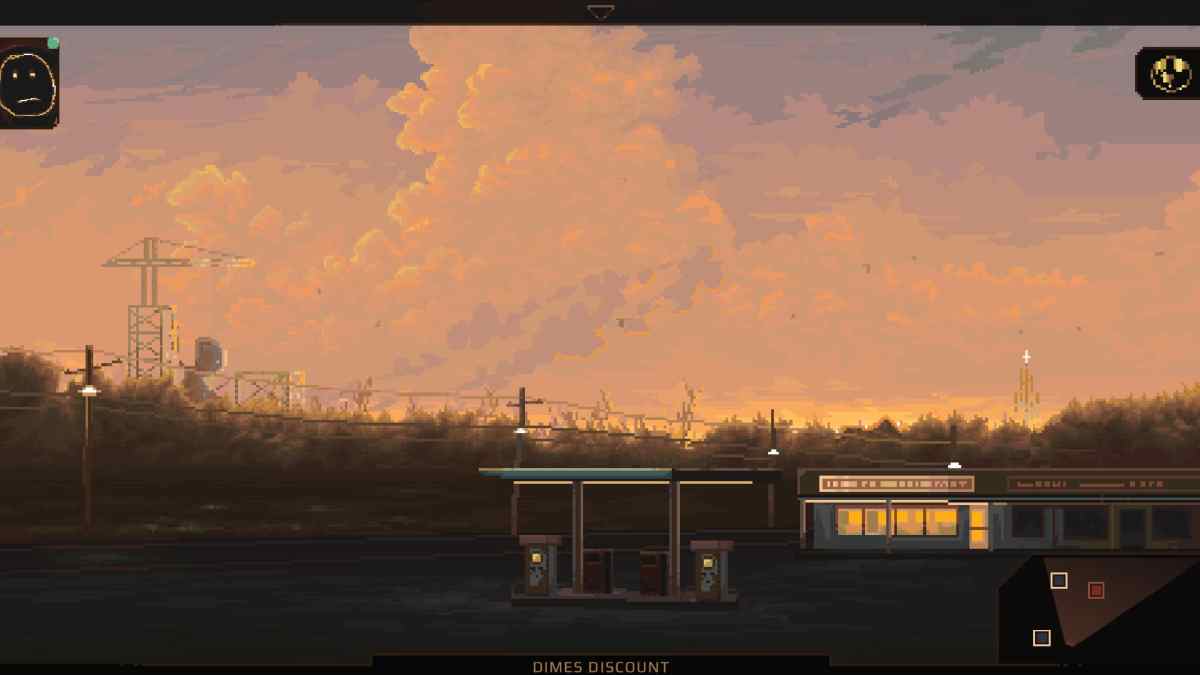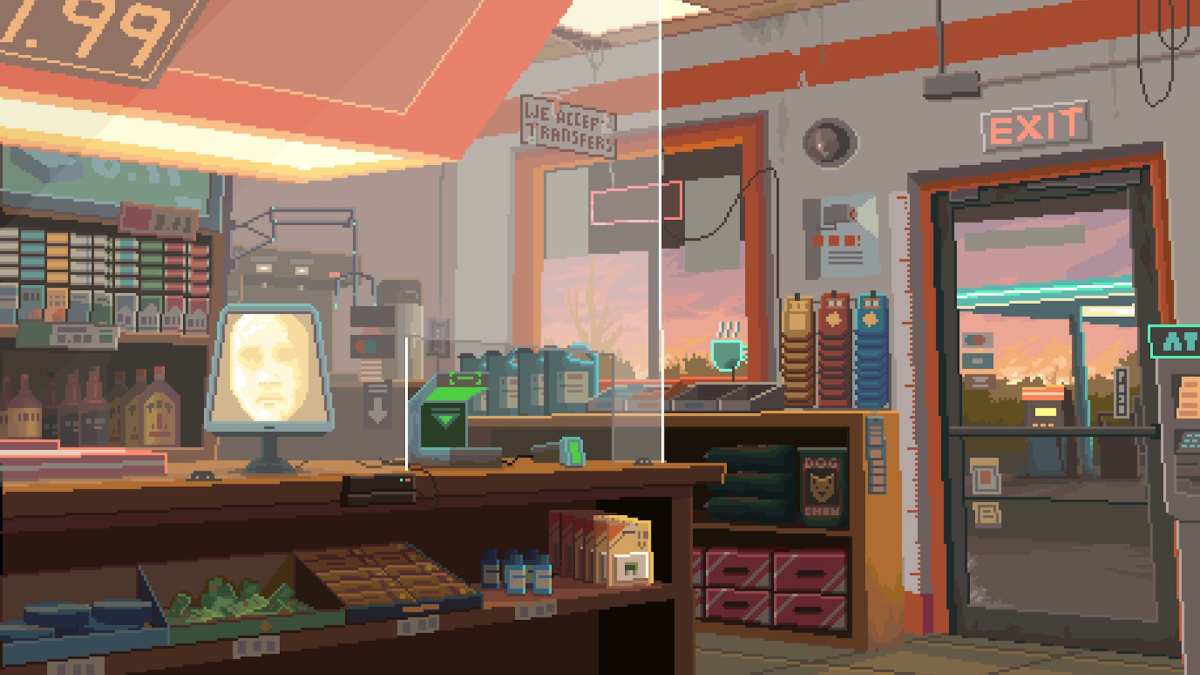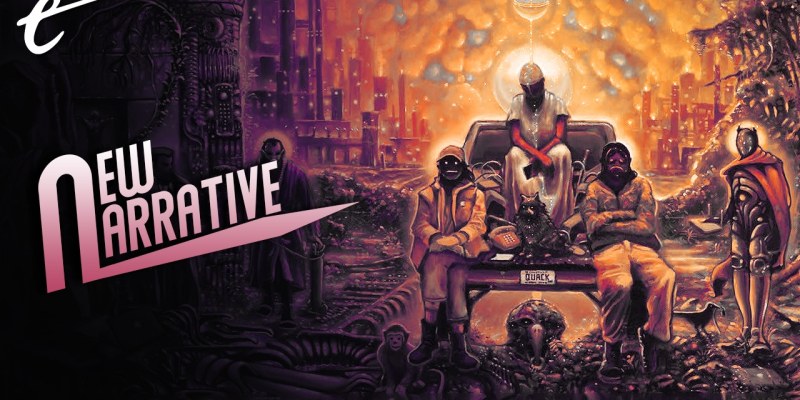“The sky bleeds a color you knew as a child,” NORCO holds me transfixed with one of its many deceptively simple sentences. I’ve written before about why the use of “you” is so effective in video games. However, this little sentence also tells me that my character knows her current location well, that she is feeling nostalgic, and it invokes my own nostalgia by referencing my own memories of childhood sunsets. It does so much in so few words, in fact, that it almost defeats its purpose — instead of pressing ahead through the story, I spend a few moments admiring the writing, pulled out of the experience to appreciate its craft.
This economy of resources is characteristic of NORCO as a whole. It builds its narrative gradually, layering new findings over established canon. You initially play as Kay, returned to her hometown of Norco, Louisiana after her mother Catherine dies of cancer and her brother goes missing. Later, you play as Catherine and switch between the two perspectives to piece together the surprising twists in NORCO’s story. Meanwhile, the town is slowly swallowed by an oil company that runs a ruthless refinery business, driving its inhabitants into poverty.
The squalid conditions are plain to see. But that they may be the product of deliberate devaluation of real estate, the exploitation of racial inequalities, or a combination of the two is suggested by a book optionally available to the player on Catherine’s bookshelf. These themes are then gradually expanded over the course of a few hours through conversations with the game’s colorful cast. It’s a typical trick for NORCO — start small, with a few peripheral suggestions at themes and story beats, then gradually bring them into focus to build a rich tapestry that ends up somewhere much more interesting than NORCO’s dystopian beginnings.

The game’s emphasis on Norco’s failings as a town make for a brooding, miserable start that has something of the languid deliberateness and much of the same sense of place as the first season of True Detective. The pixel art bird’s-eye-view vistas of foggy swamps and rivers and road trips across empty freeways do a particularly good job of channeling that atmosphere. But it soon evolves into a kind of lo-fi cyberpunk with a touch of supernatural mystery, existential deliberation, and humor.
Like everything else, the cyberpunk elements creep in slowly. There is the family robot Million, the shop run by a fully automated AI, the app reminiscent of Westworld’s RICO, which is used to accept quick-turnaround illicit work. There is versioning, a kind of digital backup of a person’s consciousness that would be at home in any Philip K. Dick novel. There are even multiple visual references to Blade Runner, from the opening shot of industrial chimney stacks silhouetted against a darkening sky, to an eye framing a flame venting from one of those stacks.
The futuristic elements jostle for space with the rundown, dirty, old pieces of town. It’s the sort of place that would have a landline payphone operated by a self-aware AI, or a dying man in a boarded-up shack with access to a corporate security network. So it’s not surprising to find elements of horror, mystery, and existential despair between NORCO’s focus on the old and the new — possible UFO sightings, fantastical creatures running the illicit app, grave robberies, a conspiracy behind Norco’s oil company, a religious prophecy, and many smaller secrets.

Likewise, the game finds plenty of time for humor. Early on, for example, Kay can advise a comically arrogant director to adapt his script to include local slang. He will then browbeat his actors into using Kay’s suggestions, no matter how absurd. In another episode, Catherine can persuade a bystander to buy expired hot dogs, and the vendor will provide vital information in exchange. Indeed, almost all of the characters in NORCO have a warmth and earnest humor to them that stands in stark contrast to their miserable surroundings.
Given the emphasis on place and narrative, it’s perhaps not surprising that NORCO’s gameplay flexes around the requirements of the story. Ostensibly, it’s a point-and-click adventure in the vein of classic titles like Broken Sword, The Secret of Monkey Island, and Westwood Studios’ Blade Runner.
The player is presented with largely static panels that offer various points of interaction to progress the story. However, in reality it eschews most point-and-click conventions in favor of a set of minigames that range from navigating a 2D boat through a Louisiana swamp to turn-based combat, pattern-matching, and timed clicking. The minigames are aimed primarily at breaking up the panels, rather than delivering meaningful gameplay. It speaks to how well those panels build atmosphere and progress the story that the relative lack of gameplay depth does little to hurt the game.
Overall, it’s an eclectic mix of influences that transforms NORCO’s initial sense of misery into a kind of relaxing, upbeat resignation. The feeling of standing in the backyard of Catherine’s house, staring out at the chimney stacks looming in the distance and listening to Gewgawly I and Thou’s soundtrack, for instance, is not dissimilar to the feeling evoked by standing on the balcony of Ray McCoy’s apartment, listening to “Blade Runner Blues” and the din of a futuristic Los Angeles. It’s not a world you’d want to live in, but it’s one that’s difficult not to get lost in.
